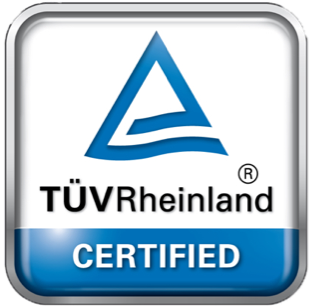Environmental Responsibility
We minimize our environmental impact and
foster environmental awareness. We recognize our
responsibility to safeguard a rich natural environment
for future generations.
Goal Achieved: Carbon Neutral
Since the first carbon emission accounting in 2019, Camelot has been officially certified as a “climate-neutral company”.
Our certification partner is TÜV Rheinland, one of the institutions for ensuring safety and quality through their certifications.
The globally recognized certification is part of Camelot’s decarbonization strategy to reduce over 50% of CO2 emissions by 2026 and to fully offset all unavoidable emissions.
Annual Process Cycle
We understand the significance of CAMELOT’s footprint and established an annual recurring process cycle to reduce it
Reporting of
Carbon Emissions
Camelot became officially certified by South Pole as carbon neutral in 2019.
Since the reporting year 2021, the carbon footprint calculation according to the GHG protocol and the carbon neutrality certification process has been conducted together with TÜV Rheinland. The long-term goal is to achieve net-zero carbon in 2026. For Camelot as a consulting company, travel and commuting are the biggest drivers of emissions. The changes in working practices brought about by the Corona pandemic have already led to a significant reduction in this area. In addition, targeted measures have been introduced that directly reduce CO2 emissions or support climate-friendly behavior. Emissions that cannot be avoided are fully offset by supporting global renewable energy projects and Clean Development Mechanism (CDM) or Gold Standard innovations.

Cooperation with TÜV Rheinland
A tradition of safety and quality

Recognition for Our Sustainability Work
Focused CO2 Reduction
Flexible Workspace
Preference for “hybrid” balancing personal interaction, efficient project delivery, travel expenses, and the carbon footprint.
No Short-Haul Flights
Verification of all flights for environmentally friendly alternatives.
Bike Leasing & E-Cars
Replacement of traditional traffic means by environmentally friendly travel.
And Much More
Camelot at a Glance
By setting ambitious reduction targets, we aim to reduce our overall carbon footprint by 57% from a 2019 base year total of 4,121 t CO2e. This translates into the reduction of scope 1 GHG emissions by 85%, scope 2 by 41%, and a reduction of scope 3 emissions by 54% by 2026. Impacts will mainly be generated within the area of travel and commuting, since these are the main drivers of our carbon footprint.
"As much as we support our clients in their transition towards sustainability, we are happy to pave the way at Camelot to be at the forefront of a carbon-free future. It's great to see so much engagement from different people and teams across Camelot to work on this joint vision of sustainability - and make it happen! #SustainableFrontrunners."
Sören Hörnicke, Sustainable Value Chain Consultant at Camelot
"The official confirmation of our carbon footprint is an important basis for us to work systematically on reducing our emissions. We don't just want to compensate; we want to consciously reduce our carbon dioxide consumption and thus make an effective and sustainable contribution to climate protection."
Jorma Gall, Managing Partner
"Personally, I feel fully committed to reducing Camelot’s impact on the environment. With our internal project team, we already achieved a trend change by implementing comprehensive measures, and we will continue with further improvements. The goal to reduce our carbon footprint by over 50% per FTE in 2026 is ambitious and the right thing to do for us."
Alexander Beis, Head of Supply Chain Information Management & CSR Council Member at Camelot
"As much as we support our clients in their transition towards sustainability, we are happy to pave the way at Camelot to be at the forefront of a carbon-free future. It's great to see so much engagement from different people and teams across Camelot to work on this joint vision of sustainability - and make it happen! #SustainableFrontrunners."
Sören Hörnicke, Sustainable Value Chain Consultant at Camelot
"The official confirmation of our carbon footprint is an important basis for us to work systematically on reducing our emissions. We don't just want to compensate; we want to consciously reduce our carbon dioxide consumption and thus make an effective and sustainable contribution to climate protection."
Jorma Gall, Managing Partner
Offsetting Non-Avoidable Emissions



Long-Term Sustainability
Innovating for Sustainable Value Chains
Innovation is pivotal in our ESG mission. We harness one of our signature strengths, our innovative power, to contribute to a sustainable world. Camelot’s GreenMind² competence center creates strategies and solutions that enable businesses to take a step forward in their sustainability journey.

